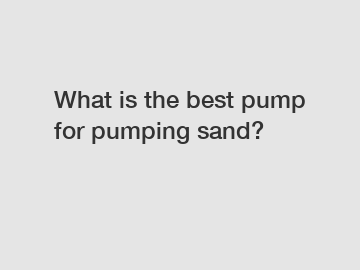Guide to Types and Applications of Slurry Pumps
Slurry pumps are vital equipment designed to handle and transport abrasive and viscous fluids containing solid particles, known as slurries. They play a crucial role in various industries where the processing, transfer, or disposal of slurry is involved. This comprehensive guide provides an overview of slurry pumps, including their types and applications.

Types of Slurry Pumps
Horizontal Centrifugal Slurry Pumps: These pumps feature a horizontal shaft and impeller, and they are the most common type of slurry pumps. They use centrifugal force to transport the slurry and are available in various configurations, including end-suction, split-case, and multistage designs.
Vertical Slurry Pumps: As the name suggests, these pumps have a vertical shaft and impeller. They are typically submerged in the slurry and used in applications where space is limited or the sump depth is significant.
Submersible Slurry Pumps: These pumps are designed to operate while submerged in the slurry. They offer a compact and efficient solution for applications that require continuous pumping or when the slurry level fluctuates.
Slurry Dosing Pumps: Dosing pumps are used for precise metering and controlled dosing of slurries, typically in applications such as chemical processing, water treatment, and mining.
Slurry Pumping Systems: Some applications require multiple pumps working together in a system. These systems may include booster pumps, booster stations, or multiple-stage pumping setups to handle high-pressure or long-distance slurry transportation.
Applications of Slurry Pumps
Mining Industry: Slurry pumps are extensively used in mining operations for various processes, including mineral extraction, ore transportation, and tailings management. They handle abrasive slurries containing minerals, rocks, and sediments.
Mineral Processing: Slurry pumps play a crucial role in mineral processing plants, where they are used for grinding circuit recirculation, flotation cell feed, and thickener underflow, among other applications.
Sand and Gravel Industry: Slurry pumps are employed in sand and gravel extraction, dredging, and processing operations. They handle slurries containing sand, gravel, silt, and other particulate materials.
What is a cylindrical roller bearing?
How to Choose the Best Camlock Handle Ring and Pin for Your Purchase?
Concentric vs Eccentric Reducer: Which is Better?
How to Extend the Lifespan of Slurry Pump Rubber Wear Parts?
What are the disadvantages of tapered roller bearings?
Revolutionary Elevator Links: The Future of Drilling
What are the different types of edge trim?
Power Generation: Slurry pumps are used in power plants for ash handling systems, transporting fly ash, bottom ash, and other coal combustion byproducts.
Chemical Processing: Slurry pumps find applications in chemical plants for handling corrosive and abrasive slurries, including those generated during chemical reactions and waste disposal.
Wastewater Treatment: Slurry pumps are utilized in wastewater treatment plants for handling sludge, grit, and other solid-laden fluids generated during the treatment process.
Construction and Tunneling: Slurry pumps are employed in construction projects involving tunneling, diaphragm walls, and bored piles. They assist in dewatering and removing excavated materials.
Ceramic and Glass Industries: Slurry pumps are used in ceramic and glass manufacturing processes to transport slurries containing fine particles, including ceramic powders and glass batch materials.
Agriculture: Slurry pumps are employed in agricultural applications for pumping manure slurries and handling irrigation and drainage water containing solid particles.
Other Industries: Slurry pumps also find applications in sectors such as steel, pharmaceuticals, food processing, pulp and paper, and dredging.
It's important to select the appropriate type and size of slurry pump based on factors such as the type of slurry, particle size, flow rate, pressure requirements, and the specific application's operating conditions.
In conclusion, slurry pumps are versatile equipment used in a wide range of industries to handle and transport slurries containing solid particles. Understanding the types of slurry pumps available and their applications is essential for selecting the right pump for a specific process or industry requirement.
Additional resources:Unveiling the Top Benefits of Investment Casting
Is Hardox MIG wire worth the investment?
Everything You Need to Know About 6 Port Hydraulic Diverter Valves
Clutch Replacement Costs: What You Need Know
Top 5 Must-Have O-Ring Kit Boxes
Unlocking the Secrets of Marine Butterfly Valves: Everything You Need to Know
Steer Clear of Subpar External Decorations: Why?
Related Articles









Comments